FAQ
How did you get started in TV?
Why do you write memoir?
At age 25 I was perplexed by what my life had become and how it gotten that way. I’d left Kentucky three times, lived in Arizona, Florida, New York City, Paris, and Boston. I’d held over thirty jobs. I had a degree in Theatre but had lost interest in acting. For a year I was a family photographer in the malls of New England, and wound up managing a nonprofit thrift store in the Hell’s Kitchen neighborhood of NYC. None of this was planned. I’d simply wanted to offset my isolated childhood by seeing the world.
In 1985 I began combing through my journals, seeking a cause-and-effect, any hint of deliberation on my part. None came to light. Each decision seemed the best at the time. This self-examination led to The Same River Twice.
In 1999 I returned to Kentucky yet again. My plan was to write a prequel to my novel The Good Brother. My in-laws, Arthur and Irene Gross, were concentration camp survivors from Poland. They had never talked about their experiences but for some reason they decided to talk to me when they visited Kentucky.
Later I realized that the reality of my return home was more interesting than the novel I had planned to write. Arthur and Irene had no home to go back to. I did, but the act of leaving had rendered me unfit for the hills. No Heroes was the unintended result.
In 2013 my father died of cirrhosis. I spent the summer in my childhood home where my parents had lived for over fifty years. Dad’s legacy to me was 1800 pounds of pornography, a desk, and a rifle. My siblings preferred to destroy the porn, but I believed that Dad deserved a bibliography, a task which necessitated careful examination of his archive. That resulted in my third memoir.
My sincere hope is that my future will prove uneventful enough not to warrant further memoir.
How did you get started in TV?
In 1995, a producer optioned a short story. He offered a low amount because he’d have to hire a professional screenwriter. I suggested that he hire me to write it and pay half what he would pay the screenwriter. The producer agreed and I wrote one of the world’s worst screenplays. The movie was never made.
Five year later another independent producer called and asked if I’d write a TV pilot. At the time my two sons were in high school and bound for college. Unfortunately I had about $7,000 saved up. I resolved to use Hollywood to pay for their educations.
I wrote the pilot, then rewrote it more than thirty times—first for the producers, then Lionsgate, HBO, TNT, and EPIX. Eventually I wrote the first four episodes. We shot the pilot but EPIX discontinued its interest in serialized TV. The script served as a calling card for staff jobs on True Blood, Weeds, and Treme.
What is your process?
Each morning I rise, make a strong cup of espresso, and write in my journal. Then I sit down to write. My mind is freshest then, well-rested.
I work on more than one project simultaneously. The reason is pragmatic: when one starts falling apart, I switch to another one until it runs into difficulty. Then I return to the first one. The only time I deviate from this practice is in the rare case of a deadline, which I try to avoid.
I prefer to work in silence and solitude, facing a blank wall. Nevertheless, I have worked in many situations: a garage, a cellar, an attic, several basements, and a garden shed. I tried writing in coffeeshops but found them too distracting.
I take notes on a daily basis, written on scraps of paper and on my phone. Once a week I compile the notes into various documents. The most important part of my process is this: I never revise until I have a full draft.
The great poolplayer, Minnesota Fats, was once asked his technique for breaking the balls. He said, “Hit ‘em hard and hope.” I try to follow his advice each time I sit down to write.
Do you have hobbies or interests other than writing?
I am a self-taught photographer and have been shooting diligently for more than 35 years. During Covid I began scanning thousands of old film negatives and organizing the newer digital images. My photographs can be seen on Instagram @chrisoffutt1 and elsewhere on this website.
My personal reading interests are varied. At different times I’ve studied Theoretical Physics, Zen thought, histories of the various international clandestine services, stage magic, and 20th Century visual art. I also like comic books, particularly those by Seth.
Since childhood I’ve had the collecting bug. Lacking money, I collected objects that were free: feathers, abandoned bird nests, animal skulls, turtle shells, antlers, rocks with holes in them, fossils, and cool looking sticks.
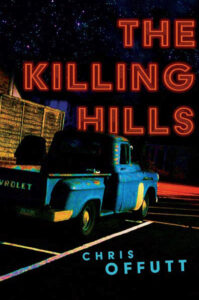
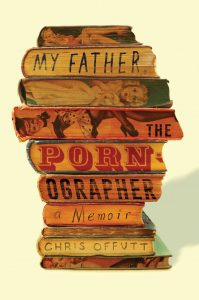 One of the most sensitive, nuanced examinations of father and son relationships.
One of the most sensitive, nuanced examinations of father and son relationships.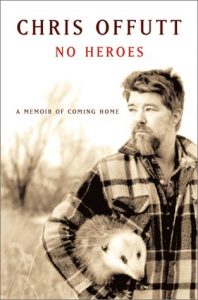 Offutt’s bold refusal to submit to nostalgic sentimentality, even as he admits defeat and forsakes his search for “home,” and his skill as prose stylist set this book apart from the many homecoming memoirs.
Offutt’s bold refusal to submit to nostalgic sentimentality, even as he admits defeat and forsakes his search for “home,” and his skill as prose stylist set this book apart from the many homecoming memoirs.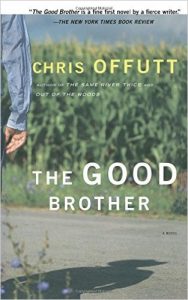 ”The Good Brother” is a fine first novel by a fierce writer.
”The Good Brother” is a fine first novel by a fierce writer. “The story of Mr. Offutt’s journey is so rich and fantastic and desperately honest that it could stand alone. But twined with the slower, lovely wanderings of a man confronting wild nature in the womb of his wife, The Same River Twice is as moving as the current he must cross and recross to find his way.”
“The story of Mr. Offutt’s journey is so rich and fantastic and desperately honest that it could stand alone. But twined with the slower, lovely wanderings of a man confronting wild nature in the womb of his wife, The Same River Twice is as moving as the current he must cross and recross to find his way.”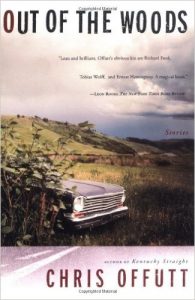 “Wariness is the main quality Offutt’s characters present to their fellow men — that and a devotion to solitude. Yet when Offutt’s characters carry their sense of solitude off to the busier, more populous parts of the American landscape, they can experience a chilling sense of alienation … For his Kentucky exiles, acting out can become a form of nostalgia.”
“Wariness is the main quality Offutt’s characters present to their fellow men — that and a devotion to solitude. Yet when Offutt’s characters carry their sense of solitude off to the busier, more populous parts of the American landscape, they can experience a chilling sense of alienation … For his Kentucky exiles, acting out can become a form of nostalgia.” “Mr. Offutt learned to tell stories, which is what he does these days, exquisitely.”
“Mr. Offutt learned to tell stories, which is what he does these days, exquisitely.” The novel is an undeniable testament to the importance and clarity of Offutt’s voice in contemporary American literature.
The novel is an undeniable testament to the importance and clarity of Offutt’s voice in contemporary American literature.